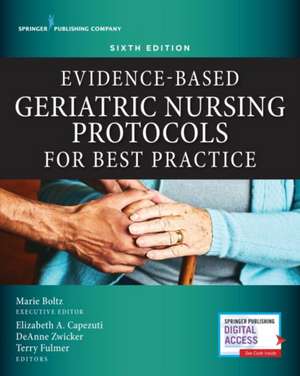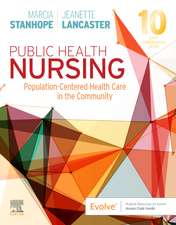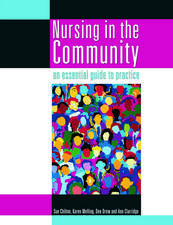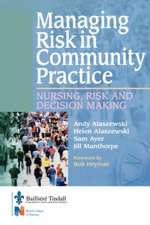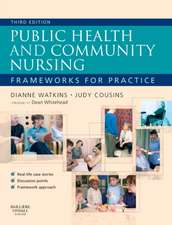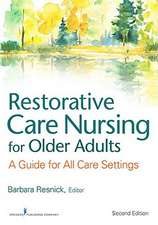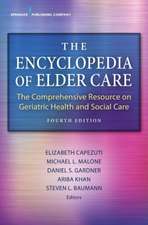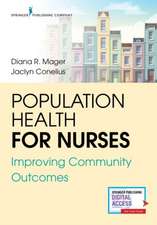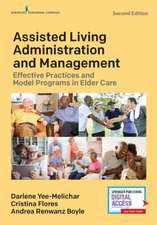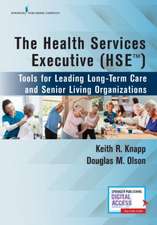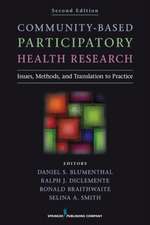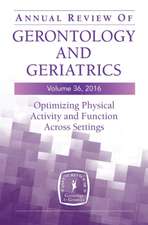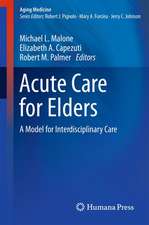Evidence-Based Geriatric Nursing Protocols for Best Practice, Sixth Edition
Autor Marie Boltz, Elizabeth A. Capezuti, DeAnne Zwicker, Terry T. Fulmeren Limba Engleză Paperback – 27 mar 2020
AJN Book of the Year 2016 First-Place Winner in Gerontological Nursing
"The evidence-based protocols are designed as a primary reference and are useful, substantive, and timely...The broader contributions of useful format and succinct review of the evidence make it likely that this text will continue to be the leading resource in nursing education and practice."--The Gerontologist
"As a gerontological clinical educator/research nurse, I will often use this as a reference. The format and the content are good, and the explanations of how to best use the evidence simplify the process of sifting through mountains of information to figure the best practice." Score: 97, 5 Stars. --Doody's
The newest edition of this distinguished reference in geriatric nursing delivers updated guidelines, new illustrative case studies, and the latest evidence-based protocols developed by leading researchers, educators, and practitioners in each topic area. The sixth edition includes new approaches devoted to supporting LGBTQ+ elders, persons living with dementia and their families, and older adults living with HIV. New operational strategies provide guidance in using the electronic health record, implementing improved person-centered care approaches, and maintaining age-friendly atmospheres.
Using evidence derived from all levels of care, this text offers developed guidelines for improving both quality and outcomes when caring for older adults in multiple disciplines, including interprofessional team members, long-term care and other staff educators, social workers, dietitians, and physicians. Chapters provide assessment and management principles, clinical interventions, specialty practice, and models of care. They consistently feature chapter objectives, annotated references, evidence ratings for each protocol, and resources for further investigation. Each protocol is embedded within the chapter content to provide context and detailed evidence. The protocols consistently include an overview, evidence-based assessment, intervention strategies, and a supporting case study with discussion. PowerPoint presentations and a test bank are available as instructor's resources.
- New Chapters:
- Informational Technology: Embedding CPGs
- Organizational Approaches to Promote Person-centered Care
- Environmental approaches to support aging friendly care
- HIV and the Older Adult
- LGBTQ+ Perspectives
- Evidence-based geriatric protocols for best practices for in-patient, in-home, and long-term care settings
- Case studies with discussions in each chapter to illustrate application of clinical practice and related Nursing Standard of Practice Protocol
- Guidelines that are developed by experts on the topics of each chapter and are based on the best available evidence
- The AGREE systematic method was used to evaluate each protocol and validate this book's content
- Instructor's resources including PowerPoints and a Test Bank
Key Features:
Preț: 882.49 lei
Preț vechi: 928.95 lei
-5% Nou
168.86€ • 176.78$ • 139.72£
Carte tipărită la comandă
Livrare economică 07-21 aprilie
Specificații
ISBN-10: 0826188141
Pagini: 922
Dimensiuni: 203 x 254 x 50 mm
Greutate: 1.81 kg
Ediția:6. Auflage
Editura: Springer
Descriere
AJN Book of the Year 2016 First-Place Winner in Gerontological Nursing
"The evidence-based protocols are designed as a primary reference and are useful, substantive, and timely...The broader contributions of useful format and succinct review of the evidence make it likely that this text will continue to be the leading resource in nursing education and practice."--The Gerontologist
"As a gerontological clinical educator/research nurse, I will often use this as a reference. The format and the content are good, and the explanations of how to best use the evidence simplify the process of sifting through mountains of information to figure the best practice." Score: 97, 5 Stars. --Doody's
The newest edition of this distinguished reference in geriatric nursing delivers updated guidelines, new illustrative case studies, and the latest evidence-based protocols developed by leading researchers, educators, and practitioners in each topic area. The sixth edition includes new approaches devoted to supporting LGBTQ+ elders, persons living with dementia and their families, and older adults living with HIV. New operational strategies provide guidance in using the electronic health record, implementing improved person-centered care approaches, and maintaining age-friendly atmospheres.
Using evidence derived from all levels of care, this text offers developed guidelines for improving both quality and outcomes when caring for older adults in multiple disciplines, including interprofessional team members, long-term care and other staff educators, social workers, dietitians, and physicians. Chapters provide assessment and management principles, clinical interventions, specialty practice, and models of care. They consistently feature chapter objectives, annotated references, evidence ratings for each protocol, and resources for further investigation. Each protocol is embedded within the chapter content to provide context and detailed evidence. The protocols consistently include an overview, evidence-based assessment, intervention strategies, and a supporting case study with discussion. PowerPoint presentations and a test bank are available as instructor's resources.
- New Chapters:
- Informational Technology: Embedding CPGs
- Organizational Approaches to Promote Person-centered Care
- Environmental approaches to support aging friendly care
- HIV and the Older Adult
- LGBTQ+ Perspectives
Key Features:
- Evidence-based geriatric protocols for best practices for in-patient, in-home, and long-term care settings
- Case studies with discussions in each chapter to illustrate application of clinical practice and related Nursing Standard of Practice Protocol
- Guidelines that are developed by experts on the topics of each chapter and are based on the best available evidence
- The AGREE systematic method was used to evaluate each protocol and validate this book's content
- Instructor's resources including PowerPoints and a Test Bank
